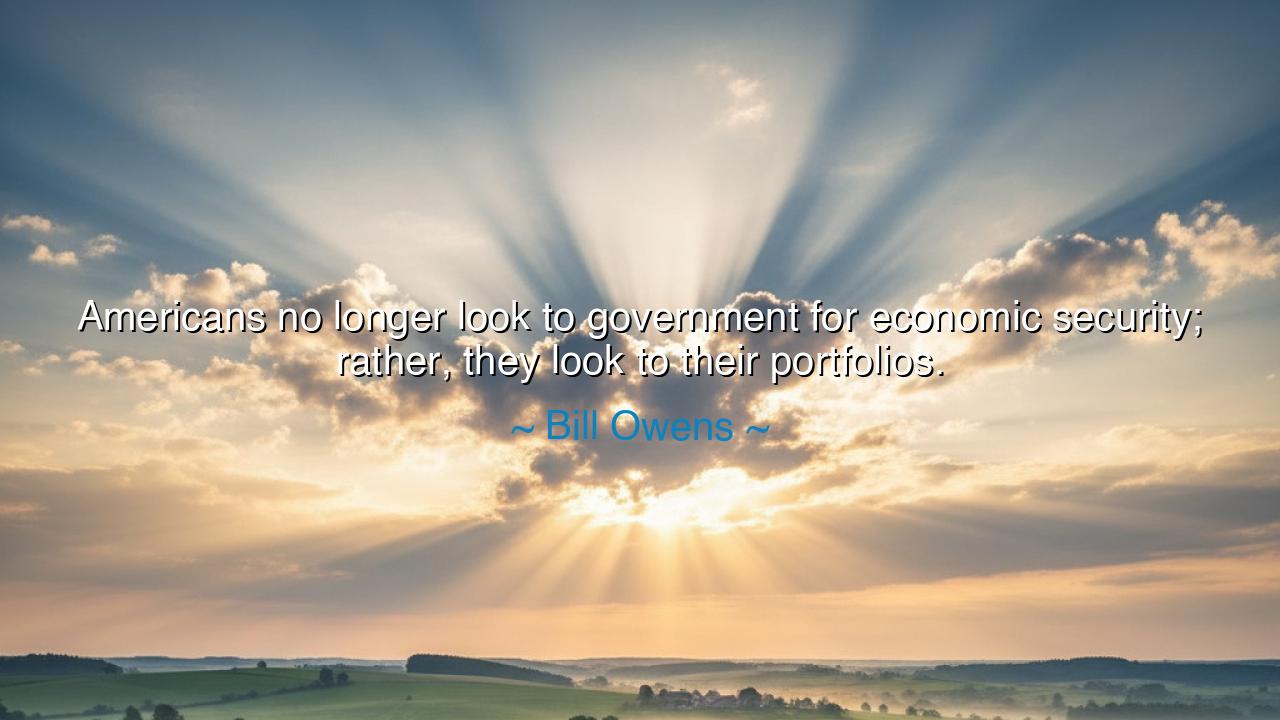
Americans no longer look to government for economic security;
Americans no longer look to government for economic security; rather, they look to their portfolios.






In the turning of the modern age, when steel towers rose where once stood farms and factories, Bill Owens, an American statesman of sober reflection, spoke words that revealed a deep shift in the spirit of his nation: “Americans no longer look to government for economic security; rather, they look to their portfolios.” In this simple observation lies a profound truth about the transformation of a people — from dependence on collective strength to faith in individual wealth, from trust in the hand of governance to the restless heartbeat of the market. His words carry not scorn, but warning: that when the fortunes of citizens are tied not to community, but to speculation, the soul of a nation changes as surely as its economy.
The origin of this quote rests in the late twentieth century, when America had emerged from the long shadow of industrial labor into the gleaming age of finance and digital prosperity. Owens saw a generation that no longer turned to the government for protection against hunger, unemployment, or ruin — as their grandparents had during the Great Depression — but instead placed their hopes in stocks, investments, and retirement funds. Security was no longer a right secured by the state; it became a dream measured by market performance. In this, he captured the pulse of a new era, one in which Wall Street replaced Washington as the arbiter of fate.
Yet this change, though born of freedom and opportunity, carried its own peril. For when men and women tether their sense of safety to their portfolios, they become servants to forces they cannot see nor control. The winds of speculation blow with neither mercy nor loyalty. Markets rise and fall like capricious gods, and when they fall — as they did in the crash of 2008 — even the prudent are caught in the ruin. The very people who once trusted their government to guard them against despair now found themselves betrayed by the invisible hand they had once worshipped. Owens’s words, spoken in observation, became prophecy fulfilled.
The ancients, too, knew this truth under different names. In the marketplaces of Athens and the forums of Rome, philosophers warned that a nation’s greatness falters when its citizens prize wealth above virtue, when the state ceases to bind them in common purpose. Rome, once the protector of its people, became a trader of indulgence and empire, and when the wealth of the few outweighed the welfare of the many, her strength rotted from within. What was once citizenship became transaction; what was once loyalty became profit. Owens’s reflection is but the echo of that same ancient decline, spoken anew in the language of modern finance.
But this is not a tale of doom. There is wisdom in his words for those who would listen. For Owens does not condemn the pursuit of prosperity — he warns against mistaking it for security. True security, the kind that endures through every storm, is not held in numbers on a screen but in the resilience of community, the integrity of work, and the virtue of stewardship. A nation cannot stand upon portfolios alone, for the market feeds the body, but the people’s faith in one another feeds the soul.
Let us recall the story of Franklin D. Roosevelt, who, in the depths of the Great Depression, rekindled the trust of a broken people not through wealth, but through leadership and collective action. He taught that government and citizen are not enemies, but partners in the building of a stable, dignified life. He reminded the nation that shared strength, not isolated fortune, is the truest wealth. Today, in the age of algorithms and speculation, that same lesson must be remembered: that while the market may reward the clever, only solidarity preserves the just.
The lesson, then, is this: guard your freedom to prosper, but never let it blind you to the bonds that make prosperity meaningful. Let your portfolio serve you, not rule you. Invest not only in assets, but in education, ethics, and empathy, for these are the currencies that never lose their value. Governments may fail, markets may crash, but a people who stand together — in purpose, in charity, in memory of their shared destiny — cannot be undone.
So remember the wisdom of Bill Owens: “Americans no longer look to government for economic security; rather, they look to their portfolios.” Let this not be a lament, but a call to balance. Seek wealth, but also seek wisdom. Build independence, but not isolation. For the measure of a nation’s strength is not found in its indexes or investments, but in the steadfast hearts of its citizens — who remember that true security is not what we own, but what we uphold.






AAdministratorAdministrator
Welcome, honored guests. Please leave a comment, we will respond soon